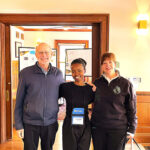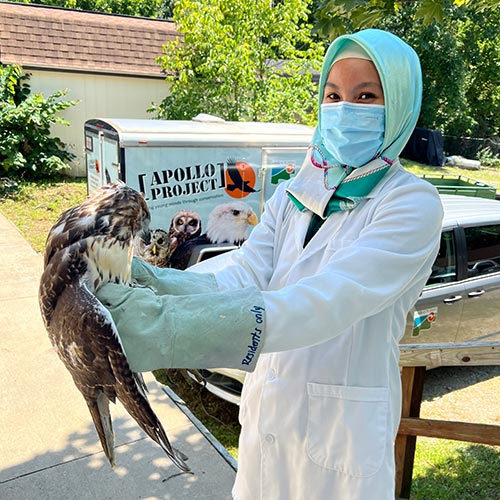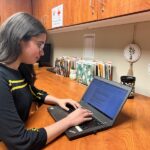
Biology and Chinese studies major explores veterinarian and conservation practices

Sammy Amier ’26, a biology and Chinese studies major at The College of Wooster, spent the summer interning for the Lake Metroparks Kevin P. Clinton Wildlife Center in Kirtland, Ohio. As an environmental studies and music minor with a public health pathway, Amier’s interest in animal health was further enunciated through her internship. During her Micro Fellowship, Amier handled and attended to animals, completing tasks such as cleaning rehabilitation cages, feeding animals, assisting with examinations, and administering shots. She also supported wildlife rescue and release efforts. Through her fellowship, Amier gained valuable insights for a veterinarian career and strengthened her goal of aiding in conservation efforts.
“The internship turned out to be a really good fit for me because I had the opportunity to work hands-on with a wide variety of wild animals undergoing rehabilitation, and I learned so much about the physiology and behavior of various species of native birds, raptors, and mammals.”
—Sammy Amier ’26
Q: How did you learn about the internship opportunity for your Micro Fellowship?
Amier: I found this opportunity on Handshake when I was looking for additional internships to apply for, and I am very glad I came across it. This internship turned out to be a really good fit for me because I had the opportunity to work hands-on with a wide variety of wild animals undergoing rehabilitation, and I learned so much about the physiology and behavior of various species of native birds, raptors, and mammals. I was able to practice how to handle different species for weighing, feeding, and transporting as well.
Q: What interests you most about the work you did?
Amier: What interests me the most is the realization that I contributed to real-time conservation work by assisting with treating and caring for injured wildlife and releasing them once they have healed, grown, and could survive independently. Most of the things I did involved cleaning out the rehabilitation cages, weighing the animals, and feeding them. A lot of the feeding was done via tube (for orphaned babies) or by hand (for birds that could not or had not been eating on their own).
Q: Who was your fellowship mentor and how did they help you to succeed in this position?
Amier: My internship supervisor was Tammy O’Neil, wildlife care manager at Lake Metroparks. O’Neil, along with the other care staff members and volunteers, taught me a lot of fascinating things about wildlife. They gave me lots of opportunities to try new skills, such as handling a new animal, assisting with examinations, and giving me the chance to administer shots. I am very grateful for their eagerness and enthusiasm to share their knowledge with me.
Q: How has the internship helped you to see what’s next for you?
Amier: The internship made me realize how much I want to work in rescuing and rehabilitating wildlife as part of conservation efforts. It made me more eager to become a veterinarian who can protect endangered species populations from human-animal conflicts and prevent zoonotic disease transmissions.
Posted in Experiential Learning, Showcase Stories 2024 on August 10, 2024.
Related Posts
Related Areas of Study
Public Health
Explore the many options and paths for those who want to be part of the world of health care
PathwayEnvironmental Studies
Natural sciences, social sciences, and humanities courses combine for those who want to be part of environmental solutions
Major MinorBiology
Explore molecular and cellular biology, ecology and more with top faculty and access to extensive lab facilities.
Major Minor

